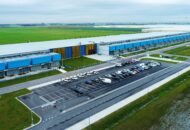At Christmas time I am inevitably more aware of the domestic computer industry, I suppose most of us are. I am staggered at how much money is spent on computer games and electronic toys, but that is typical of pensioners like me, who were brought up in a much less affluent era.
Needless to say the revolution in domestic computing is extremely important to the commercial IT industry that we work in. Most of the influences are indirect, but the technology is fantastic and must generate a lot of research and development that is incorporated into commercial products.
To evaluate the possible impact on the commercial IT industry the domestic market can be split into three sectors, electronic toys, games machines and software for PCs; there is also a need for specialist peripherals for PCs such as joysticks. The toys must have done a lot for the battery industry, but they must also have generated advances in low-power, highly integrated circuits, technologies which can now be incorporated in portable data capture terminals for instance. Voice synthesis and recognition technologies have also matured in toys. I suppose that portable telephones can to some extent be placed in this category as far as technology advances are concerned.
The domestic PC has a more immediate impact on IT though. Today school children are taught to use a PC, either with Windows or Macs, and there is an inevitable knock-on effect to the parents. This means that there is a more computer literate user base, but unfortunately one with a very narrow view of IT. There is an old saying that "a little knowledge is a dangerous thing" and nowhere could this have been better demonstrated than in the mindless use of PCs in industry. Nevertheless it is better that there is some general knowledge of computing created by the domestic use of PCs.
The PC revolution, both commercial and domestic has had a big impact on developments. I curse the incompetent software developers who consume vast amounts of memory, simply because it is there. But this has caused the price of both RAM and disc storage to come crashing down. This in turn enables a lot of new applications. The common PC uses are for word processing, e-mail and Web access, with some simple accounting packages and personal data bases. These don’t make demands on storage or on processing power, but now the emphasis is on graphics. The word processors today exploit graphics for "what you see is what you get" displays, an irritating increase in file sizes for e-mail applications, but much more user friendly otherwise, but the major growth applications are music and photographic/video processing, both of which consume vast amounts of storage and have only been enabled by the low price of today’s discs and RAM.
Music and the PC are deeply involved with the Internet, CD drives and licencing problems. All have an impact on commercial IT. The CD ROM player enabled home users to play music on their PC, but this inevitably lead to the development of drives which can write CDs as well as read them. Software is provided to make the CD compatible with either music or data, the latter providing a back-up mechanism of adequate capacity, but both encourage the illegal copying of software and music. Add the development of formats efficient enough (MP3) for use on the Internet and there are major problems with licencing. The demands of the domestic sector will resolve this eventually and commercial IT can benefit from the technologies developed.
Photographic processing has encouraged the development of some good software, but has also accelerated the development of printers and scanners. Flatbed scanning is a generally useful concept, a spin-off from Fax machines, but high resolution slide and negative scanners and direct interfaces to digital cameras now allow the enthusiast as well as the semi-professional to process and print pictures. This is a real advance if well employed in producing marketing material, brochures, reports, etc. This has also encouraged further developments with printers, which are quite remarkable, capable of producing prints competitive with mass produced prints. The whole digital camera revolution is geared to the developments in domestic PCs.
There is no doubt that the domestic PC may be a pain at times, but it is a source of important technical developments.





